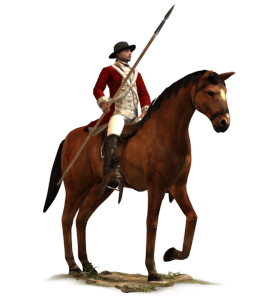Difference between revisions of "East India Company Lancers (ETW Unit)"
Fire-dweller (talk | contribs) m (Quick-adding category "Cavalry" (using HotCat)) |
Tango12345 (talk | contribs) m (Removed category "Empire Total War Units"; Quick-adding category "ETW Units" (using HotCat)) |
||
| (8 intermediate revisions by 4 users not shown) | |||
| Line 1: | Line 1: | ||
| − | {{Unit|image=[[Image:EIC Lancers.jpg]]|Class=Lancer | + | {{TW Unit|image=[[Image:EIC Lancers.jpg]] |
| + | |Class=Lancer Cavlary | ||
| + | |Unit Size=60 Men | ||
| + | |Weaponry=Lances | ||
| + | |Region=India | ||
| + | |Recruitment Cost=920 | ||
| + | |Upkeep Cost=270 | ||
| + | |Building Requirements=Drill School | ||
| + | |Tech Requirements=None | ||
| + | |Attributes=<li>Can Hide in Woodland</li> | ||
| + | <li>Resistant to Heat Fatigue</li> | ||
| + | <li>Can Form Wedge Formation'</li> | ||
| + | <li>Can Form Diamond Formation</li> | ||
| + | }} | ||
| + | |||
| + | |||
| + | [[Image:EIC_Lancers.png]] These cavalrymen are armed with a long spear or lance that makes them particularly deadly when charging. | ||
==Overview== | ==Overview== | ||
| Line 7: | Line 23: | ||
Historically, many nations used lancers, although the European fashion for them owes much to the uhlans: cavalry raised for Austrian and Prussian service. The French adopted lancers with some enthusiasm, and Napoleon even included Polish lancers in his Imperial Guard. In India the lance had long been used as a weapon, and lancer skills were often improved by “pegging” (picking tent pegs out of the ground with the lance tip) or pig-sticking (hunting wild pigs or even wild dogs with the lance). Native Indian lancers were rightly feared by European troops. | Historically, many nations used lancers, although the European fashion for them owes much to the uhlans: cavalry raised for Austrian and Prussian service. The French adopted lancers with some enthusiasm, and Napoleon even included Polish lancers in his Imperial Guard. In India the lance had long been used as a weapon, and lancer skills were often improved by “pegging” (picking tent pegs out of the ground with the lance tip) or pig-sticking (hunting wild pigs or even wild dogs with the lance). Native Indian lancers were rightly feared by European troops. | ||
| − | [[Category:Cavalry]] | + | == Details == |
| + | |||
| + | Lancers are a very different type of cavalry from the standard regiments of horse. They have significantly worse melee and defense stats in general; however, they have a much higher charge bonus. This makes them very suitable for charging enemy positions and to break enemy morale, but less apt in a pitched battle. Due to the fact that Lances are inadequate in close combat it is advised that lancers should be use to charge, withdraw and then charge again in order to efficiently use their charge bonus. | ||
| + | |||
| + | ==Factions== | ||
| + | |||
| + | *[[Image:Britain_flag.jpg|25px]] [[Great Britain (ETW Faction)|Great Britain]] | ||
| + | |||
| + | [[Category:ETW Cavalry]] | ||
| + | [[Category:ETW Units]] | ||
Latest revision as of 09:50, 30 May 2017
 These cavalrymen are armed with a long spear or lance that makes them particularly deadly when charging.
These cavalrymen are armed with a long spear or lance that makes them particularly deadly when charging.
Overview
The lance is probably the oldest cavalry weapon. It gives the user a chance to put all the momentum of himself and his charging horse into one very sharp point that can, in the hands of a skilled man, be driven right through any man. This is what makes lances so intimidating to face but, if the lancer does not kill his target, he is then vulnerable. A long lance is a good deal less use in a melee than a sword, and a lancer is at a disadvantage once the close fighting starts.
Historically, many nations used lancers, although the European fashion for them owes much to the uhlans: cavalry raised for Austrian and Prussian service. The French adopted lancers with some enthusiasm, and Napoleon even included Polish lancers in his Imperial Guard. In India the lance had long been used as a weapon, and lancer skills were often improved by “pegging” (picking tent pegs out of the ground with the lance tip) or pig-sticking (hunting wild pigs or even wild dogs with the lance). Native Indian lancers were rightly feared by European troops.
Details
Lancers are a very different type of cavalry from the standard regiments of horse. They have significantly worse melee and defense stats in general; however, they have a much higher charge bonus. This makes them very suitable for charging enemy positions and to break enemy morale, but less apt in a pitched battle. Due to the fact that Lances are inadequate in close combat it is advised that lancers should be use to charge, withdraw and then charge again in order to efficiently use their charge bonus.
